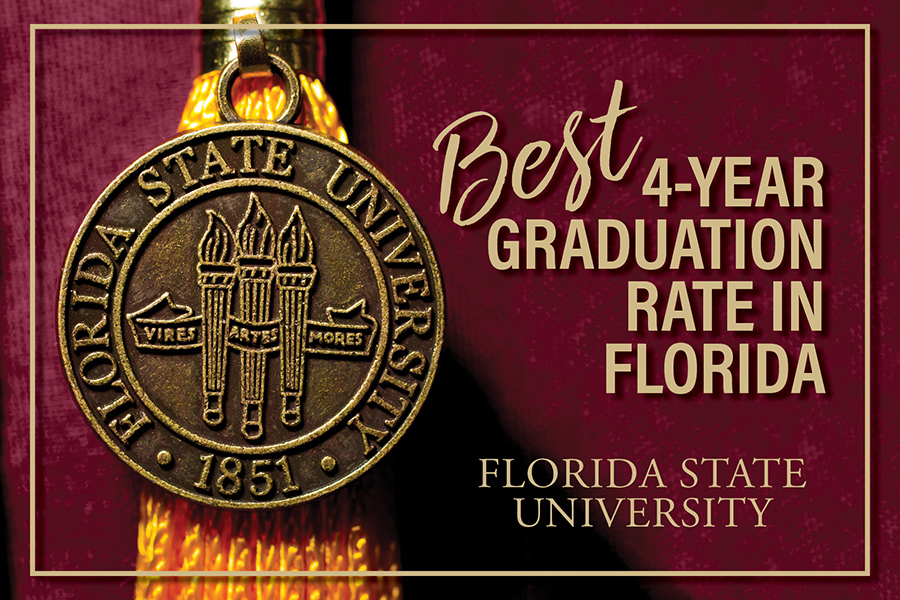
Florida State University now has the best four-year graduation rate of any public university in Florida, according to data that will be part of the State University System’s 2021 Accountability Plan later this year.
The university’s four-year graduation rate is 74 percent, placing FSU first in the State University System of Florida and in the top 10 nationally among public universities. More significantly, it’s the highest four-year graduation rate in the State University System’s history. In addition, FSU posted a six-year graduation rate of 84 percent — also a university record.
“This is a tremendous accomplishment that reflects well on our academically talented students as well as our dedicated faculty and staff who inspire and support them,” said FSU President John Thrasher. “The Florida Legislature, the Florida Board of Governors and the FSU Board of Trustees have championed our efforts, and the investments we have made in student success are paying off, not only for our students and their families but for Florida taxpayers who support our state universities.”
Sally McRorie, provost and executive vice president for Academic Affairs, said the record rate is a wonderful accomplishment for FSU’s students and the faculty and staff who work with them every day.
“Everyone at the institution really pulls together to challenge our students and give them lots of opportunities and support,” McRorie said. “The 74 percent four-year graduation rate is really quite phenomenal — not only is it the best in the state of Florida, it’s also in the top 10 in the nation.”
Everyone at the institution really pulls together to challenge our students and give them lots of opportunities and support. The 74 percent four-year graduation rate is really quite phenomenal — not only is it the best in the state of Florida, it’s also in the top 10 in the nation.
— Sally McRorie, provost and executive vice president for Academic Affairs
Graduation rates have steadily risen in recent years as a result of careful and strategic investments in areas such as academic advising, tutoring and academic coaching.
When they arrive at Florida State, students are provided an academic map which gives them a guideline for planning courses along their journey to earn a degree. Academic advisers also encourage students to “Take 15” — to carry at least 15 credit hours per semester — which keeps them on track to graduate in four years.
For undergraduate students with high credit hours who are trying to cross the finish line to graduation, the Graduation Planning and Strategies Office (GPS) lends support to those confronting barriers to completion. GPS seeks these students out and assists them to overcome challenges and complete their degrees. Since 2017, nearly 1,500 students have posted degrees after working with the GPS team.
Two years ago, FSU started Engage 100 for freshmen and transfer students to bolster high-impact engagement. The program benefits new students by helping them develop personal, social and professional awareness and skills through participating in activities that align with their academic and personal goals, and it also aims to address hurdles that can be detrimental to retention, such as a student’s distance from home.
“All of these things build on one another,” McRorie said. “They build a culture of excellence. They build a culture where students come here expecting to have excellent academics and we want them to find it here.”
There’s also been a concerted focus by faculty to design their classes and their teaching in a way that ensures the success of all their students.
“Student success goes beyond support like tutoring, advising and financial aid,” said Joe O’Shea, dean of Undergraduate Studies and assistant provost. “We must also make sure that our classes are designed and taught in a way that all students can succeed. We’ve made remarkable progress in that area, and I’m so grateful to our faculty for their efforts.”
O’Shea said he is especially proud of the students’ persistence and tenacity during a pandemic, along with how the university responded to changing circumstances. For example, the university pivoted to offer several services and programs in a virtual format to reach students where they were living.
“The shifting that has happened in the last year because of the pandemic could have easily derailed students’ college plans,” O’Shea said. “The fact that we supported them to graduation, and they continued on, is a testament to their resilience and to the university’s collective efforts.”
Most notably, in its strategic approach to student success, Florida State has virtually erased graduation rate gaps between all categories of underrepresented and traditional student populations.
FSU reaches at-risk populations through programs such as the Center for Academic Retention & Enhancement and Unconquered Scholars. CARE is a nationally recognized program that provides first-generation and underrepresented students with the necessary tools, resources and support network they need to flourish in the collegiate environment, while Unconquered Scholars supports students who have aged out of foster care and/or are homeless.
“Our students — regardless of their background — are succeeding at such an amazing level and that is one of the things I’m most proud of,” McRorie said. “It reflects FSU’s culture of care and excellence.”
While these continued increases are welcome news, O’Shea said FSU’s approach to student success is about more than the just the numbers.
“I think one thing that’s really special about FSU is we really care deeply about how students develop holistically in addition to making sure that they graduate,” O’Shea said.
“We want students to thrive at FSU and beyond, so that they excel in their personal and professional lives. We want to produce the kind of graduate that you’d want to hire as a future employee, as well as the kind of person you’d want as your neighbor or community member. We’re striving to unlock students’ potential and enable them to address the challenges facing the world.”




